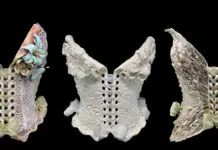Jefferson Keel, 65, is in his fourth term as lieutenant governor of the Chickasaw Nation, which occupies 13 south-central Oklahoma counties straddling Interstate 35 from Oklahoma City to the Texas border. Keel is also president of the National Congress of American Indians, an organization of 270 tribal governments.
Oklahoma Magazine: You are a man of many titles. Should we call you Lieutenant Governor Keel or President Keel or (U.S. Army) Captain Keel?
Jefferson Keel: You can just call me Jefferson. How about that?
OM: The Chickasaw National Recreation Area near Sulphur is one of Oklahoma’s most beautiful and overlooked scenic destinations.
JK: It’s a beautiful area there. We’re doing some things there that will help with tourism, especially in the area around the park.
OM: You must be referring to the Chickasaw Cultural Center. One responsibility of the Chickasaw lieutenant governor is overseeing the division of History and Culture. Does that mean you were a prime mover in creating the Cultural Center?
JK: It has been a combined effort over the past several years. We started working on that well over 20 years ago; yes, I did have quite a lot to do with that.
OM: What kind of public reception has the Center received since it opened in 2010?
JK: It has been tremendous. There have been literally thousands of visitors there. It’s a place where people can go and learn a little bit about the history of the Chickasaw Nation.
OM: In November, you began your fourth four-year term as lieutenant governor. Do you hope to serve as governor one day?
JK: I don’t think about that. (Governor) Bill Anoatubby is just a tremendous leader. I’ve been blessed to serve alongside him.
OM: Which takes more of your time, your work for the Chickasaw Nation or for the National Congress of American Indians?
JK: Right now, with all of the things that have been going on nationally, the National Congress has just been extremely busy.
OM: What issues have demanded your attention?
JK: The health care law was one of the things that was of major concern. The Indian Health Care Improvement Act was part of the Affordable Care Act. With the Supreme Court ruling (declaring most of the act constitutional), we were fortunate enough to have that part of the Act stand.
OM: What other issues have you been working on?
JK: Another thing is the native vote. This is an election year, and we’re trying to get everybody to vote and at least participate in the process.
OM: Long before entering public service, you had a laudable military career in the U.S. Army. You fought in Vietnam, receiving two Purple Hearts, a Bronze Star and numerous other commendations. Many Vietnam vets prefer not to talk about those days. What about you?
JK: I made some tremendous friends there, and I also lost a lot of friends. When we came back from Vietnam, the country really didn’t care for us. I have put all of that behind me. I enjoyed my military service. The military was good to me.
OM: You lead a very busy life. Having just turned 65, do you think about slowing down and enjoying a retirement?
JK: As long as my health is good, and right now it is, I don’t foresee stopping any time soon. I love what I’m doing now. I’ve been blessed with representing the Chickasaw Nation. There is nothing I’d rather be doing.

























